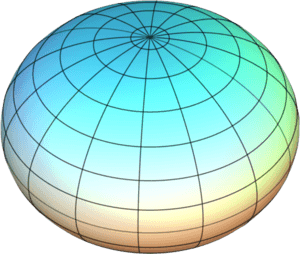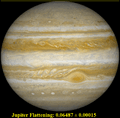Oblate spheroid facts for kids
An oblate spheroid is a special shape. Imagine a perfect ball, like a sphere, but then gently squashed from the top and bottom. This makes it a bit wider around its middle than it is tall.
Many planets, including our own Earth and Saturn, have this shape. They are not perfectly round spheres. The Earth, for example, is slightly wider at its equator (the imaginary line around its middle) than it is from pole to pole. This difference is very small for Earth, only about one part in 300.
Oblate spheroids have a special kind of balance. They are symmetrical, meaning they look the same if you spin them around an imaginary line going through their poles.
Why Planets Aren't Perfect Spheres
Have you ever wondered why planets aren't perfectly round? The main reason is because they spin! When a planet spins, the material near its middle (the equator) gets pushed outwards. This is similar to how water spins outwards when you stir it in a bowl.
This outward push is called centrifugal force. It works against the planet's own gravity, which tries to pull everything towards the center. Because of this push and pull, the planet bulges out slightly at its equator and flattens at its poles.
Isaac Newton's Discovery
A long time ago, in 1687, the famous scientist Isaac Newton explained this idea. He wrote a book called Principia. In it, he showed that any large, spinning object made of fluid (like a planet that is mostly liquid or gas inside) will naturally become an oblate spheroid.
The faster an object spins, the more it flattens out. For example, Jupiter and Saturn are gas giants and spin much faster than Earth. Because of their fast spin, they are more noticeably flattened than Earth.
Even stars, like our Sun, are oblate spheroids because they spin. Some stars spin incredibly fast, causing them to be very flat!
Images for kids
-
The planet Jupiter is an oblate spheroid with a flattening of 0.06487
-
A rugby ball.
See also
 In Spanish: Esferoide para niños
In Spanish: Esferoide para niños
 | William M. Jackson |
 | Juan E. Gilbert |
 | Neil deGrasse Tyson |




